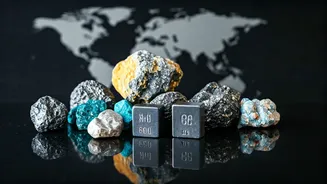The Mineral Stakes
Critical minerals are indispensable in modern technology. They are crucial for electronics, renewable energy infrastructure, and defense systems. Countries
are eager to secure supplies of these minerals. The scarcity of these materials has led to strategic competition among nations. This scramble has economic and geopolitical ramifications, potentially reshaping alliances and power structures. This competition is not just about resources; it's about technological dominance and national security. The countries holding these valuable resources are in a position of significant leverage. The uneven distribution of these minerals exacerbates this competition. This situation calls for new international collaborations or it could sow seeds of instability.
Geopolitical Shifts
The scramble for critical minerals is influencing global power dynamics. Nations are forming new alliances to secure access to these resources. This can result in both cooperation and increased tensions. Countries are investing in mining operations and exploring new trade routes. These efforts can create friction, as each nation pursues its interests. The quest for critical minerals creates opportunities for both collaboration and conflict. The changing global landscape highlights the need for a strategic approach to resource management and international relations. The countries that control these essential resources are gaining strategic advantage. This dynamic is reshaping geopolitical alliances, as nations seek to safeguard their access to vital materials.
Economic Ramifications
The hunt for critical minerals also has significant economic consequences. The prices of these resources can fluctuate dramatically, affecting industries and economies. Investments in mining and related technologies are increasing, opening new markets and creating job opportunities. However, the dependence on specific suppliers can make economies vulnerable. The competition for these minerals could lead to trade disputes and economic protectionism. The development of alternative technologies and recycling initiatives is crucial to reduce this reliance. The economic impact spans across various sectors, impacting manufacturing, energy, and defense. It highlights the intricate link between resource control, economic growth, and global trade.
Indian Perspective
India's position in the critical minerals race is significant given its rising technological and industrial demands. Securing access to these resources is vital for its economic growth and strategic autonomy. This involves partnerships with other nations and investments in its domestic mining sector. India also needs to develop its expertise in processing and refining these minerals. Strengthening the domestic industry requires investments in research and development. India’s strategic approach will influence its ability to compete in the global marketplace. India's partnerships are crucial to secure a consistent supply of these minerals. Ensuring resilience by securing access is critical to India’s goals.
International Cooperation
The challenge of the critical minerals race is driving a need for international collaboration. Establishing frameworks for sustainable resource management and responsible sourcing is essential. Multilateral organizations and diplomatic efforts can facilitate cooperation among nations. Promoting transparency and accountability within the supply chain is also critical. These strategies can mitigate risks and ensure that benefits are shared equitably. It also involves establishing norms and regulations. International cooperation is not just about resource access; it is also about fostering global stability. This will require new partnerships and cooperation in trade. Collaboration will be vital for global sustainable development.
Future Outlook
The future of the critical minerals race is uncertain, but it promises significant shifts in global dynamics. Technological innovations, changes in demand, and geopolitical developments will shape this landscape. The focus on sustainability will drive innovation in recycling and alternative material usage. The role of government and private sectors in this race will evolve. The competition will remain fierce. This period calls for strategic adaptability, careful planning, and a commitment to international cooperation. The implications of this global scramble will influence the economic and political course. The way nations approach this will determine the shape of the global order.












